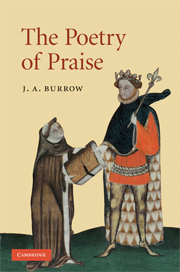Book contents
Chapter 2 - Old English, especially Beowulf
Published online by Cambridge University Press: 22 September 2009
Summary
Writings such as the Poetria Nova of Geoffrey of Vinsauf or Hermann's Averroistic Poetics addressed themselves to the writing and reading of Latin poetry, and they would have been accessible only to an educated minority trained in the disciplines of grammar and rhetoric. Yet what these treatises articulate about praise as a prime function of poetry also applies widely to early poetry in the vernaculars – upon which, after all, the teachings of such as Aristotle had been partly founded in the first place. Poets composing in unlearned languages did not need to be trained in the trivium (though some certainly were) to sound the note of praise. And so they insistently do – insistently, at least, to a modern ear.
Praise of gods, rulers and heroes evidently play a prominent part in the poetry of traditional societies, whether in medieval Europe or elsewhere. Many modern studies point to this conclusion. I have earlier quoted the opinion of one Classical scholar that kleos, the act of praising famous deeds, dominated the poetry and song of archaic Greece. In their study The Growth of Literature, the Chadwicks compared the early writings of Greece with those of Britain, Ireland and Iceland. They observed that in these ‘island literatures’ also glorification of past heroes, panegyrics on living princes and the like represented ‘one of the most widely distributed types of poetry’. Much the same could be said of many non-European societies.
- Type
- Chapter
- Information
- The Poetry of Praise , pp. 29 - 60Publisher: Cambridge University PressPrint publication year: 2008



